 Petzlover
Petzlover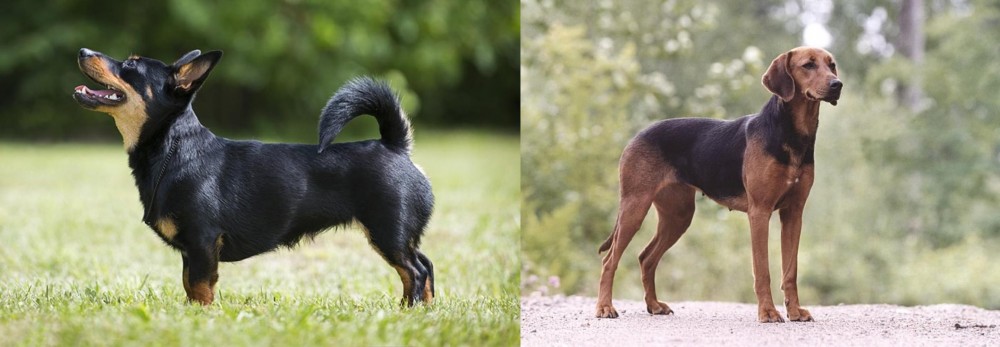 Lancashire Heeler is originated from United Kingdom but Schillerstovare is originated from Sweden. Lancashire Heeler may grow 30 cm / 11 inches shorter than Schillerstovare. Lancashire Heeler may weigh 19 kg / 41 pounds lesser than Schillerstovare. Both Lancashire Heeler and Schillerstovare has almost same life span. Both Lancashire Heeler and Schillerstovare has almost same litter size. Both Lancashire Heeler and Schillerstovare requires Low Maintenance.
Lancashire Heeler is originated from United Kingdom but Schillerstovare is originated from Sweden. Lancashire Heeler may grow 30 cm / 11 inches shorter than Schillerstovare. Lancashire Heeler may weigh 19 kg / 41 pounds lesser than Schillerstovare. Both Lancashire Heeler and Schillerstovare has almost same life span. Both Lancashire Heeler and Schillerstovare has almost same litter size. Both Lancashire Heeler and Schillerstovare requires Low Maintenance.
 The Lancashire Heeler, known also as the Ormskirk Heeler or Ormskirk Terrier, hails from England and is looked upon as a vulnerable breed by the Kennel Club in the 21st century.
The Lancashire Heeler, known also as the Ormskirk Heeler or Ormskirk Terrier, hails from England and is looked upon as a vulnerable breed by the Kennel Club in the 21st century.
He was developed to be a cattle drover, but is essentially a companion dog today. Exact details of the origin of the Lancashire are unknown, but it is generally accepted that Welsh Corgis were used as well as a kind of black and tan terrier known as the Manchester Terrier.
In England, he has been known as a general working dog for more than a century.Gwen Mackintosh began breeding these dogs in the 1960s and the Lancashire Heeler Club was established in 1978. The dog was also placed on the Endangered Breeds in 2003.
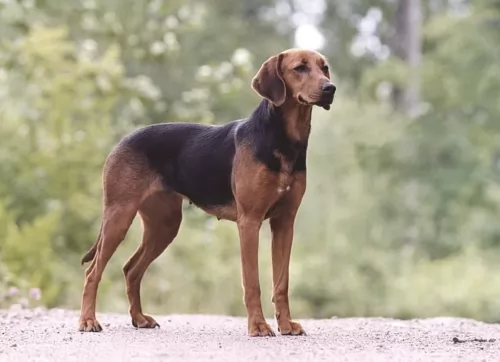 The Schillerstövare originated in Sweden, being named after a Swedish farmer, Per Schiller. After he died, the dog was named Schillerstövare in 1907, and was Sweden's first native dog breed.
The Schillerstövare originated in Sweden, being named after a Swedish farmer, Per Schiller. After he died, the dog was named Schillerstövare in 1907, and was Sweden's first native dog breed.
The Swedish Kennel Club recognised this dog in 1907 and it is also recognised by the Federation Cynologique Internationale as well as a number of minor kennels and dog clubs.
The dog has always been used as a hunting dog and the English Foxhound is the e foundation for this breed.
 As a small breed dog, the Lancashire Heeler stands at 25 – 31cm in height, both male and female, and the dog weighs in the region of 2 to 6kg.
As a small breed dog, the Lancashire Heeler stands at 25 – 31cm in height, both male and female, and the dog weighs in the region of 2 to 6kg.
Looking quite similar to a Corgi or a German Shepherd with short legs, the Heeler’s legs are meant to be fairly straight and not bandy-legged. He has a short, weather-proof coarse coat that can be black or liver-colored, with tan markings. The coat is regarded as low maintenance. The hair is slightly longer around his neck.
The ears are erect, the eyes brown and bright and the tail these days is left long with a slight curl.
Intelligent, stubborn, strong willed, playful and friendly, the Lancashire Heeler is capable of making you an excellent pet and companion.
This dog is smart and learns quickly. He is energetic and playful, strong and robust and more than willing to take part in all the activities that you’re taking part in.
With training and socialization he makes a splendid pet, but he doesn’t put up well to abuse and disrespect from younger children. He is willing to get along with other pets in the home too.
 The Schillerstövare is a medium to large sized dog. They’re athletic and muscular.
The Schillerstövare is a medium to large sized dog. They’re athletic and muscular.
Standing at between 53–61cm in height and weighing in the region of 18–25kg, the coat of the dog is fairly short and harsh, with the color being black and tan.Sometimes you’ll see some white markings on the chest and paws.
The head is domed, the eyes brown, bright and alert and the ears of the dog are broad, medium length and floppy. The long tail is carried low or held out when running or alert.
If you allow your Schillerstovare to have puppies, you can expect between 3 to 7.
The Schillerstovare is a calm dog but he can get petty lively when there’s a game to be had. He gets on well with well disciplined children who have been taught to be kind and respectful to animals. He also gets on well with pets in the home. Just like with most other dogs, he will need to be trained and socialized as he is a strong willed, confident, dominant dog.
He is friendly and active but will be somewhat reserved around strangers.These dogs will require a lot of exercise and will need quite a bit of space too. They aren't well suited to small properties in the city. He will need a daily walk but also a chance to get off his leash and run free in the park. Other forms of exercise such as hikes, ball game and swimming will delight him.
 As with any dog breed, there are wide variations in temperament. A dog essentially turns out the way it was brought up, similar to a child. Angry, harsh, aggressive, uncaring dog owners produce a dog that is both timid and aggressive, unsure, frustrated and with behavioral problems.
As with any dog breed, there are wide variations in temperament. A dog essentially turns out the way it was brought up, similar to a child. Angry, harsh, aggressive, uncaring dog owners produce a dog that is both timid and aggressive, unsure, frustrated and with behavioral problems.
Make your dog part of your family, provide him with good food, exercise and love and he will make an awesome pet.
The Lancashire Heeler is such an amicable, social dog at heart, and treated well, he will turn out like is inherent characteristics. He is an outgoing, friendly dog, more so when he has been trained and socialized. He will adapt to city- or country life, so long as he is exercised each day.
The Heeler has a good, balanced temperament, and counted in as a loved family member, you’ll make sure he stays that way.
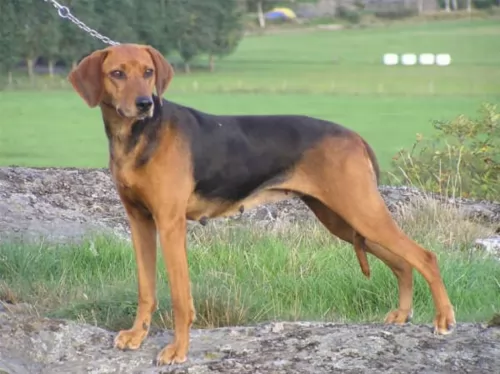 Schillerstovares are social, loving, friendly, loyal dogs who enjoy being around their human family. He’s going to need a lot of exercise, both mental and physical to keep him from boredom and frustration.
Schillerstovares are social, loving, friendly, loyal dogs who enjoy being around their human family. He’s going to need a lot of exercise, both mental and physical to keep him from boredom and frustration.
He will rely on you for at least a daily walk. He is strong-will and confident and will do well in a family where they are active and where they are firm, patient, kind and consistent in their behaviour towards him because then he ticks all th right boxes for being a splendid pet.
 Your Heeler can live to be 14, 15 or 16 years of age and live even longer than this with the right care. He is such a healthy breed, but one of the common dog illnesses to look out for are eye diseases.
Your Heeler can live to be 14, 15 or 16 years of age and live even longer than this with the right care. He is such a healthy breed, but one of the common dog illnesses to look out for are eye diseases.
This is where the ligaments of the eye are weakened so that the lens actually loosened and then displaced, causing pain for the dog. This displacement can obstruct fluid drainage from the eye too and your vet may need to perform surgery.
The shock-absorbing intervertebral discs can have spinal compression and contribute to significant pain for your pet. Early signs will see your Lancashire Heeler being reluctant to jump on his chair like he may once have done. Preventing obesity is important for reducing pressure on the dog’s spine.
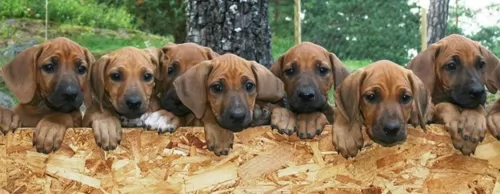 Even though your Schillerstovare is a healthy dog breed, hip dysplasia is a common dog disease that many dogs get.
Even though your Schillerstovare is a healthy dog breed, hip dysplasia is a common dog disease that many dogs get.
This is a skeletal disease when a dog’s hip joints become partially dislocated. It can be very difficult for your dog to get around, and he can also develop arthritis. It gets very sad when your dog doesn’t even want to participate in games anymore.
 Known as a low maintenance dog, the Lancashire Heeler’s short coat will require little grooming, just a good brush twice a week.
Known as a low maintenance dog, the Lancashire Heeler’s short coat will require little grooming, just a good brush twice a week.
If your Heeler doesn’t wear his nails down naturally, they will need to be clipped as part of the grooming process. Ears should also be checked regularly. Excess wax and dirt can build up which can lead to an ear infection. This can drive your dog mad with frustration. Teeth also need to be brushed regularly.
Remember, if you feel guilty for not getting to grooming your pet, there are professional groomers at your local vet or who work independently and they will do all of this for you.
Your Lancashire Heeler is such a social, active little dog who is always willing to be counted in to all your fun and games. If you’re lucky to have a fair sized garden, involve him in some ball games, or use a rope for him to tug on while you pull the other side. Whenever you go for a walk, he will be thrilled to join you as he loves picking up all those new scents outside his garden.
Nutritious food is important for longevity and health in a dog. Every dog has different dietary needs throughout their lives – when they’re puppies, when the female is pregnant, after they’ve been spayed or neutered, as a working dog, when they’re sick, when they’re old and so on.
There are some good dog brand foods to use, but you want to choose the best ones to ensure your dog gets all the vitamins and minerals needed as opposed to those that are packed with colorants, preservatives and fillers.
Home-made food is important too and some cooked chicken, cooked rice and raw or cooked vegetables can be added to his dry kibble from time to time. Don’t complicate your dog’s diet – just feed him plain, wholesome food like this with a little bit of raw meat added in occasionally. Simple, nutritious food will ensure he is energetic, bright eyed and happy. Make sure he always has fresh, cool water.
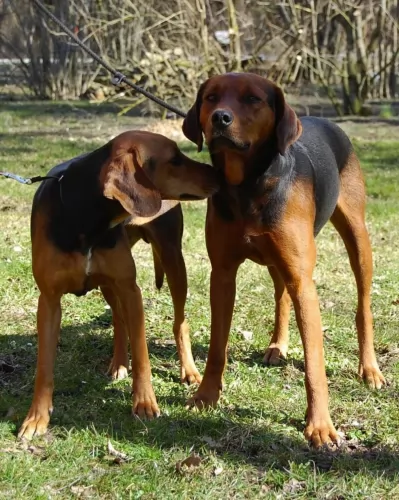 With his short coat, the Schillerstovare is considered a low maintenance dog and requires a minimal amount of grooming. Brushing should be done twice a week to remove loose hair. The harsh outer coat seems to repel dirt and dust.
With his short coat, the Schillerstovare is considered a low maintenance dog and requires a minimal amount of grooming. Brushing should be done twice a week to remove loose hair. The harsh outer coat seems to repel dirt and dust.
Trim your pet’s nails, check inside his ears for signs of redness, make sure his eyes are bright and clear and make sure he doesn’t have any unusual lumps on him.
Make sure his vaccines are up to date to avoid deadly canine diseases. Take him to the vet when you suspect he isn’t his normal self.
Dogs, just like humans, do well on good, nutritious diets. Feed a human lots of junk food and sweets and they’ll grow up to be obese and unhealthy. That's exactly how it is with dogs too. Some of the best commercially manufactured dog foods are convenient and they can be good if you look at the top brands. Look for ones that cater for your dog’s age, size, breed and activity levels. This dry kibble can be made more inviting for your pet when you include some homemade food.
Dogs just want simplicity so that they don’t battle with digestive problems. Boiled chicken, sweet potatoes, brown rice or pasta, carrots and spinach will be wonderful for him when you chop the food up and add it into the dry kibble twice a week. See his tail wag and his brown eyes light up when he smells this treat. Some raw meat added up occasionally will also contribute to your pet’s heath.
Make sure he is never without a constant supply of fresh, cool water.